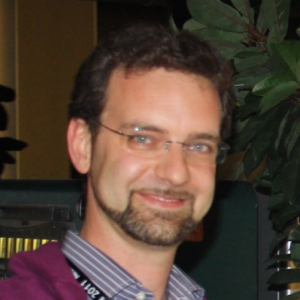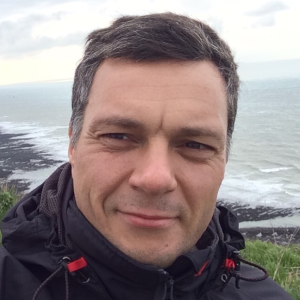Keynotes
Andrea Passarella
Abstract: Cyber-Physical Convergence is a way to define the blurring between the cyber world (enabled by Internet technologies, services and apps) and the physical world. Together with advanced Internet services, this trend is nowadays boosted by the diffusion of personal mobile devices, of miniaturised "things", and the pervasiveness of wireless networks. Jointly, these elements support a constant flow of data between the two worlds, which in turn results in actions taken in either of them, with mutual impact on each other. Examples are, among others, smart cities, where the cyber world constitutes a "nervous control system" of the physical city infrastructures, or Online Social Networks, where social relationships in the physical world impact on the users' behaviour in the cyber world, while communities formed online generate actions and behaviours in the physical word (e.g., people gatherings, protests, parties).
In this talk I will motivate why in this perspective inter-disciplinary research is such an exciting and powerful approach for human-centric networking systems. I will go through a number of cases where information about the behaviour of the humans is exploited to design efficient networking and computing systems, primarily supporting data dissemination between users in mobile self-organising networks. This goes beyond conventional bio-inspired approaches. Here personal mobile devices are seen as "proxies" of their users in the cyber world, and therefore include human behaviour models as core components of their functionalities. At the level of the individual person, I will discuss how models of the cognitive process of the brain can be exploited to design efficient self-organising data dissemination schemes implemented in users' mobile devices. At the level of the social behaviour, I will show how models of people's social structures can be exploited to support data dissemination in Mobile Social Networks. I will also discuss how evolutionary anthropology models of human social organisations can be used to analyse the social structures in Online Social Networks, and the patterns of information diffusion at varying levels of trustworthiness. Finally, I will discuss how the two dimensions (individual and social) can be blended together to design even more efficient data dissemination schemes in mobile networks. The talk will conclude by discussing some perspectives and open issues along these research directions.
 About the speaker:
Andrea Passarella (Ph.D 2005) is currently a Researcher at the Institute for
Informatics and Telematics (IIT) of the National Research Council of Italy
(CNR). Prior to join IIT he was with the Computer Laboratory of the University
of Cambridge, UK. His research interest include Online and Mobile social
networks, opportunistic, ad hoc and sensor networks, with special emphasis on
inter-disciplinary aspects. He has published 100+ papers on these topics,
receiving the best paper award at IFIP Networking 2011 and IEEE WoWMoM 2013. He
is co-author of the book "Online Social Networks: Human Cognitive Constraints in
Facebook and Twitter Personal Graphs" (Elsevier, 2015), and was Guest Co-Editor
of several special sections in ACM and Elsevier Journals and of the book
"Multi-hop Ad hoc Networks: From Theory to Reality" (2007). He is the chair of
the IFIP WG 6.3 "Performance of Communication Systems".
About the speaker:
Andrea Passarella (Ph.D 2005) is currently a Researcher at the Institute for
Informatics and Telematics (IIT) of the National Research Council of Italy
(CNR). Prior to join IIT he was with the Computer Laboratory of the University
of Cambridge, UK. His research interest include Online and Mobile social
networks, opportunistic, ad hoc and sensor networks, with special emphasis on
inter-disciplinary aspects. He has published 100+ papers on these topics,
receiving the best paper award at IFIP Networking 2011 and IEEE WoWMoM 2013. He
is co-author of the book "Online Social Networks: Human Cognitive Constraints in
Facebook and Twitter Personal Graphs" (Elsevier, 2015), and was Guest Co-Editor
of several special sections in ACM and Elsevier Journals and of the book
"Multi-hop Ad hoc Networks: From Theory to Reality" (2007). He is the chair of
the IFIP WG 6.3 "Performance of Communication Systems".
Klaus Wehrle
Abstract: The behavior of networked systems is determined by their implementation, their configuration, and most importantly their interactions: any input may arrive at any time. To ensure that networked systems function as intended, a thorough analysis of their behavior is of upmost importance. Since network interactions are beyond the influence of the system developer the implementations of networked systems must be able to handle all possibilities and uncertainties of network input and input timings. The difficulty of considering these in all implementations is the source of most reliability and interoperability issues.
This talk will present the first steps towards a new methodology based on Symbolic Execution that aims at combining the benefits of model checking (rigorous exploration) and of dynamic software testing (analyzing real systems' code) to enable a thorough analysis and prediction of the behavior of networked systems.
The talk presents KleeNet, the first symbolic analysis tools for network input and discusses the path towards the analysis of temporal uncertainty in network interactions.
 About the speaker:
Klaus Wehrle is professor of Computer Science and head of the Chair of
Communication and Distributed Systems at RWTH Aachen University, Germany.
He received his Diploma and PhD from University of Karlsruhe, both with
honors. In 2002 and 2003, he was postdoctoral researcher at ICSI at UC
Berkeley. From 2004 till 2006 he headed junior research group on
Protocol Engineering and Distributed Systems at University of Tübingen.
In 2006, he joined RWTH Aachen University as associate professor, later
as full professor.
His research activities are focused on (but not limited to) engineering
of networking protocols, (formal) methods for protocol engineering and
network analysis, network simulation, reliable communication software as
well as all operating system issues of networking.
About the speaker:
Klaus Wehrle is professor of Computer Science and head of the Chair of
Communication and Distributed Systems at RWTH Aachen University, Germany.
He received his Diploma and PhD from University of Karlsruhe, both with
honors. In 2002 and 2003, he was postdoctoral researcher at ICSI at UC
Berkeley. From 2004 till 2006 he headed junior research group on
Protocol Engineering and Distributed Systems at University of Tübingen.
In 2006, he joined RWTH Aachen University as associate professor, later
as full professor.
His research activities are focused on (but not limited to) engineering
of networking protocols, (formal) methods for protocol engineering and
network analysis, network simulation, reliable communication software as
well as all operating system issues of networking.